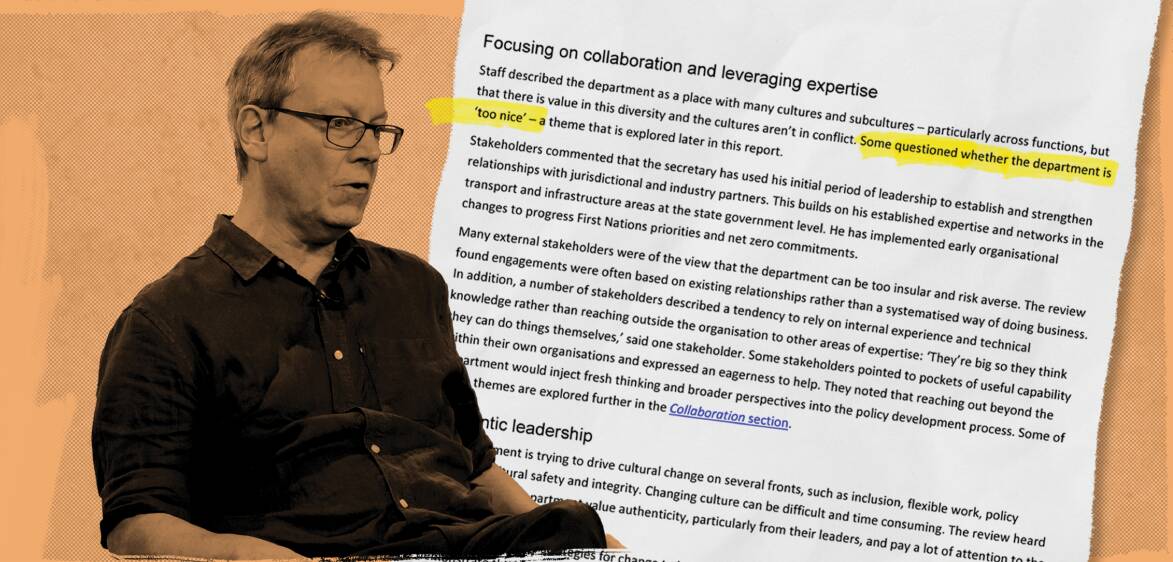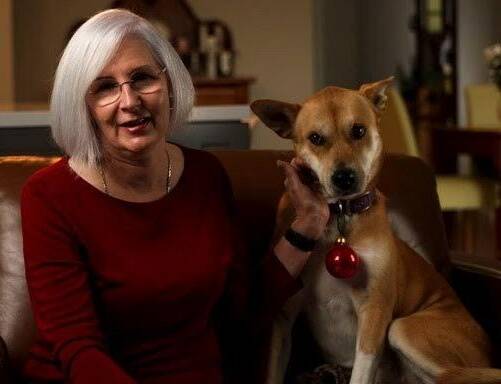Have you ever heard of a workplace that is "too nice"?
That appears to be the case at the Department of Infrastructure, Transport, Regional Development, Communications and the Arts, according to a recently published capability review.
The review - which examined "the agency's ability to meet future objectives and challenges" - remarked at the department's "warm and supportive" culture, reporting that workshops with 100 staff found that many people stayed because of their colleagues and supervisors.
But it turns out that the agency's "friendly nature" might be impacting its ability to have "difficult conversations" with staff, especially around underperformance.

"One interviewee said the department 'needs to make sure the culture isn't too nice, that it has performance requirements built around it'," the report said, adding that in 2021-2022 only one employee was placed on a formal underperformance process.
It sounds like the agency's positive culture comes all the way from the top.
In an address to staff in May this year, secretary Jim Betts told workers that he wanted people to "be kind, inclusive, collaborative, creative, daring and fearless", according to the report.
"He has encouraged staff to seize the moment of strategic opportunity to think creatively and offer up long-term, evidence-based policy ideas," the report continued.
While we are on the topic of Mr Betts, we also learnt that he runs shadowing days that staff can sign up for, which sees them working side-by-side with him for the day.
The report took the mega agency to task on a number of key challenges (which we have covered in more detail elsewhere), including its perceived insular culture, higher-than-average staff turnover, and need to articulate a clear central purpose.
But the reviewers - two current public servants and one former - remarked at how "the leadership team demonstrated humility and openness towards this capability review, and a genuine desire to make improvements".
"The review team greatly appreciated the department's self-assessment, which was a powerful, humble and honest guide to the organisation's strengths and opportunities," they wrote elsewhere.
Maybe the department should to take a lesson out of the reviewers' book - this report was a lesson in how to deliver tough truths in a compliment sandwich.
Department takes training to a whole new reality
We at Public Eye love trawling through government contracts, and one recent listing from the Department of Agriculture, Fisheries and Forestry caught our attention: an agreement worth $22.5k for "virtual reality headsets".
Of course, we had to know more. A departmental spokesperson confirmed that the agency is in fact procuring six upgradable headsets, which will be used by the Northern Australia Quarantine Strategy to help train Indigenous rangers (as well as school groups and community members).
The department is contracting 65 Indigenous ranger groups to "undertake biosecurity surveillance activities in the north in the early detection of exotic pests, diseases and weeds," the spokesperson told Public Eye.
The headsets will also be used at an upcoming forum for more than 200 Indigenous rangers that the department is running in October.
"[The headsets] demonstrate how the north of Australia is a vulnerable high-risk pathway to the possibility of exotic plant, animal and aquatic pest and disease incursion from countries to our north," the spokesperson said.
"The vision showcases the unique challenges of biosecurity in this region and includes experiences across all jurisdictions including the Torres Strait high risk pathway."
Office for Women gains executive director
Padma Raman will start today in the Department of Prime Minister and Cabinet in a newly-created role as the executive director of the federal Office for Women.
Ms Raman joins from the Australian National Research Organisation for Women's Safety (ANROWS), where she has served as CEO since 2021.
ANROWS board chair, Sam Mostyn, said that under Ms Raman's leadership, the organisation had "become widely recognised as the leading, authoritative voice to end violence against women and children".
Australian National University Chancellor, and former federal minister, Julie Bishop said Ms Raman - who also serves on the ANU Council - was a "stellar appointment" and that the government "could not have selected a stronger leader for this vital role".
"Padma has been a champion for women and their children for many years and has worked tirelessly to make significant and long-lasting change," Ms Bishop said in a statement.
Thanks for the memories: Rebecca Skinner, Sparkles, to exit top job
Services Australia has delivered two big pieces of news in the last fortnight, with chief executive office Rebecca Skinner apologising to staff for the "unfair toll" of robodebt last Friday September 8, and then announcing her retirement on Tuesday.

Ms Skinner told staff her last day would be September 29 in an email message, urging them to make "kindness, hard work and integrity" priorities in their work.
In another line, which piqued Public Eye's interest, she thanked them for their support: "If the days were tough I was buoyed on by your emails and unexpected, touching gifts for Sparkles."
It seems staff are quite familiar with Sparkles, Ms Skinner's dog. In 2022 the agency boss gave more insight in an interview with the Institute of Public Administration ACT.
"For me personally, people in Services Australia will know, I walk my dog, she is called Sparkles, she is slightly odd," she said. "And she was a rescue dog from the pound earlier this year."
Wishing Sparkles a restful retirement from public life.
Your SES survival guide
The Public Service Commission has approached the market for a new supplier for its SES orientation program, with hopes to give the course a "refresh".
The program will take six to eight weeks, including five contact days in Canberra, and up to 14 different cohorts per year will go through it, according to AusTender documents.
Senior bureaucrats learn about expectations of leadership, influencing and enabling others, accountabilities and governance and operating in changing, diverse and complex environments.
Face-to-face workshops are held at the Museum of Australian Democracy (Old Parliament House). Not bad.
It's anticipated that there will be a "significant refresh of the existing program" but this is unlikely to happen in the first year of the new contract.
This comes as the APS Commission introduces more oversight of the performance of the most senior public servants, and takes a greater role in hiring them.







